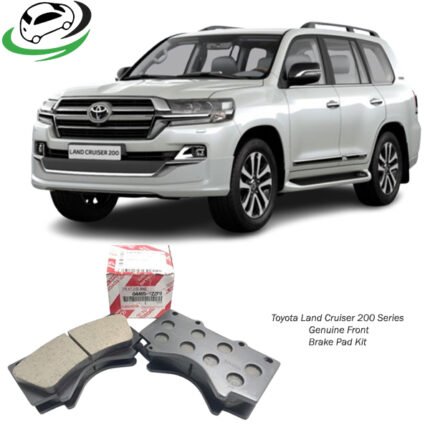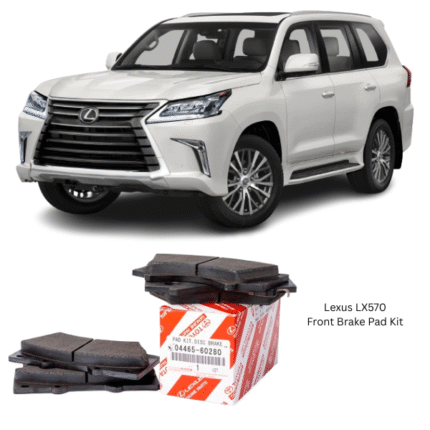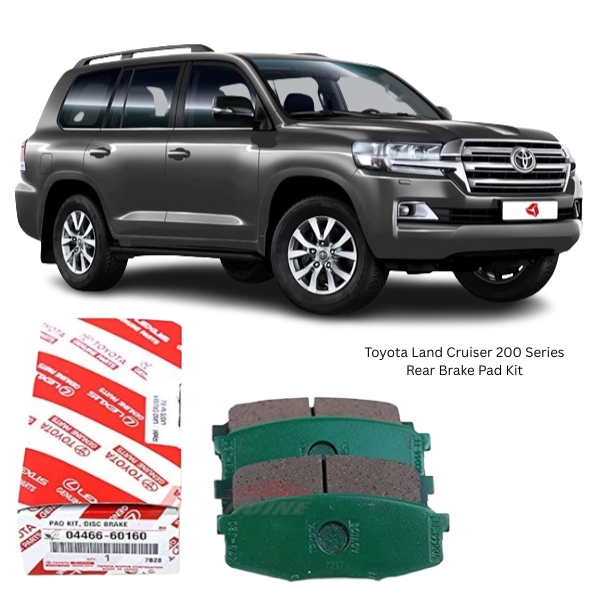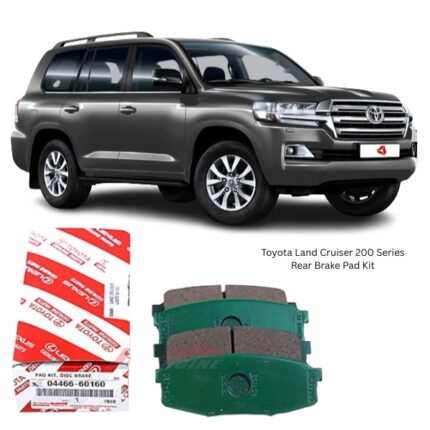Get Toyota Land Cruiser 200 Series Genuine Rear Brake Pad Kit 04466-60160 in Kenya
The braking system in a vehicle is one of its most critical components, ensuring safe operation by allowing the driver to slow down or stop when necessary. While front brakes typically handle more of the braking load due to the weight transfer that occurs during deceleration, rear brakes play an equally important role in maintaining vehicle stability and overall braking efficiency. The rear brake pad kit is essential for vehicles equipped with disc brakes at the rear wheels. This guide provides a detailed explanation of rear brake pad kits, including their functions, benefits, and maintenance tips.
Functions of Rear Brake Pad Kits
A rear brake pad kit consists of several components designed to work together to provide smooth and effective braking performance. The primary components of a typical rear brake pad kit include the brake pads, shims, and hardware (such as clips and pins). Each of these parts serves a specific function to ensure optimal braking performance.
1. Brake Pads
The brake pads are the central part of the kit, responsible for creating friction when they come into contact with the brake rotors. When the brake pedal is pressed, hydraulic pressure pushes the brake calipers, which then press the brake pads against the rotors. The friction generated by this contact slows down or stops the vehicle.
- Friction Material: Brake pads are made of high-friction materials that can withstand the extreme heat generated during braking. This friction material ensures consistent braking performance even under harsh conditions.
- Wear Indicator: Many rear brake pads come equipped with a wear indicator that alerts the driver when the pads are worn out and need to be replaced. This indicator typically makes a squealing noise, signaling that it’s time for maintenance.
2. Shims
Shims are thin pieces of metal or composite material placed between the brake pads and the brake calipers. Their primary function is to reduce noise and vibrations during braking, ensuring a smooth and quiet operation.
- Vibration Damping: Shims help absorb vibrations, reducing the risk of brake noise, such as squealing or grinding. This improves comfort and reduces wear on other braking components.
3. Hardware
The hardware in a rear brake pad kit includes components such as clips, pins, and bolts. These parts are crucial for securing the brake pads in place and ensuring they function properly within the brake caliper assembly.
- Proper Alignment: The hardware ensures that the brake pads are correctly aligned and securely fastened, which helps prevent uneven wear and improves the overall efficiency of the braking system.
Benefits of Rear Brake Pad Kits
Investing in a high-quality rear brake pad kit provides several benefits, both in terms of safety and vehicle performance. While aftermarket or generic kits may be less expensive, opting for a genuine or high-quality brake pad kit is essential for maintaining optimal braking performance and avoiding premature wear or failure. Here are some key benefits of using a good rear brake pad kit:
1. Enhanced Safety
The primary function of any braking system is to ensure the vehicle can stop safely and effectively. A reliable rear brake pad kit provides consistent braking power, reducing stopping distances and ensuring safe operation in various driving conditions.
- Balanced Braking: While front brakes handle most of the braking force, rear brakes play a crucial role in maintaining balance. A well-functioning rear brake pad kit ensures that the braking force is distributed evenly, improving overall stability during braking.
- Consistent Performance: High-quality rear brake pads maintain their performance even under extreme conditions, such as heavy braking, towing, or driving in mountainous regions. This consistency is essential for avoiding brake fade, which can occur when brake pads overheat and lose their ability to generate friction.
2. Longer Lifespan
A high-quality rear brake pad kit will typically last longer than cheaper, aftermarket alternatives. This is due to the superior materials and manufacturing processes used in the production of genuine or premium brake pads.
- Durable Materials: Premium brake pads are made from materials that can withstand the high levels of heat and friction generated during braking. This reduces the rate of wear and extends the lifespan of the pads, saving you money on frequent replacements.
- Reduced Wear on Rotors: Rear brake pads that are too hard or made from low-quality materials can cause excessive wear on the brake rotors, leading to costly repairs. A high-quality brake pad kit is designed to work harmoniously with the rotors, minimizing wear and extending their life.
3. Quieter Braking
Brake noise can be an annoyance for drivers and passengers alike. A rear brake pad kit with well-designed shims and high-quality friction materials can significantly reduce noise during braking.
- Noise Reduction: The shims in a rear brake pad kit are designed to absorb vibrations and reduce the noise generated when the brake pads make contact with the rotors. This results in smoother, quieter braking.
- Comfort: Quieter braking improves the overall driving experience, providing a more comfortable and pleasant ride for both the driver and passengers.
4. Better Heat Dissipation
During braking, a significant amount of heat is generated due to the friction between the brake pads and the rotors. Excessive heat can reduce braking efficiency and lead to brake fade. A high-quality rear brake pad kit is designed to dissipate heat more effectively, maintaining performance even under heavy use.
- Heat Resistance: The friction material used in premium brake pads is engineered to withstand high temperatures without degrading or losing its effectiveness. This is particularly important during long descents or when towing, where the brakes are subjected to continuous use.
Maintenance of Rear Brake Pad Kits
Proper maintenance of your rear brake pad kit is essential for ensuring the longevity and effectiveness of your vehicle’s braking system. Here are some key maintenance tips to keep in mind:
1. Regular Inspections
It is important to regularly inspect your rear brake pads for signs of wear and tear. Most brake pads come with a wear indicator, but visual inspections can also help you identify any issues before they become serious.
- Check Pad Thickness: Brake pads typically start with a thickness of 10-12 mm. If the pads have worn down to 3 mm or less, it’s time to replace them.
- Look for Uneven Wear: If one side of the brake pad is more worn than the other, it could indicate an issue with the calipers or brake hardware. Uneven wear can reduce braking efficiency and lead to premature pad failure.
2. Replace Worn Pads Promptly
When your brake pads wear down to the wear indicator or if you notice a decrease in braking performance, it’s crucial to replace them immediately. Driving with worn-out brake pads can damage the rotors and other components, leading to costly repairs.
- Prevent Rotor Damage: If the brake pads wear down to the metal backing plate, they can cause deep grooves or scoring on the brake rotors. This not only reduces braking performance but can also require rotor replacement, which is more expensive than replacing the pads.
3. Avoid Hard Braking
Driving habits can significantly affect the lifespan of your rear brake pads. Avoiding hard braking and sudden stops can help extend the life of your brake pads.
- Anticipate Stops: Instead of slamming on the brakes, try to anticipate stops by slowing down gradually. This reduces the heat generated during braking and minimizes wear on the brake pads and rotors.
- Avoid Overloading: Carrying too much weight in your vehicle can put extra strain on the brakes, leading to faster wear. Be mindful of your vehicle’s weight limits and avoid overloading whenever possible.
4. Brake Fluid Maintenance
Brake fluid plays an essential role in the braking system by transferring the force from the brake pedal to the brake calipers. Over time, brake fluid can become contaminated with moisture, which can reduce braking performance.
- Regular Fluid Checks: Check the brake fluid level regularly and top it off as needed. If the fluid appears dark or cloudy, it may be time for a brake fluid flush to remove contaminants.
- Bleed the Brakes: Air bubbles in the brake lines can reduce the effectiveness of the braking system. Bleeding the brakes helps remove any trapped air and ensures optimal brake performance.
Conclusion
A rear brake pad kit is a critical component of your vehicle’s braking system, ensuring safe and efficient stopping power. By investing in a high-quality rear brake pad kit, you can enjoy the benefits of enhanced safety, quieter operation, and longer-lasting performance. Proper maintenance, including regular inspections and timely replacements, will help extend the life of your brake pads and ensure that your vehicle’s braking system remains in top condition.
Whether you’re driving in everyday traffic or tackling more demanding road conditions, a reliable rear brake pad kit is essential for maintaining control and safety on the road. By choosing quality parts and following good maintenance practices, you can ensure that your vehicle’s brakes perform at their best, providing peace of mind for every journey.
Follow us on Facebook for more parts.





Reviews
Clear filtersThere are no reviews yet.